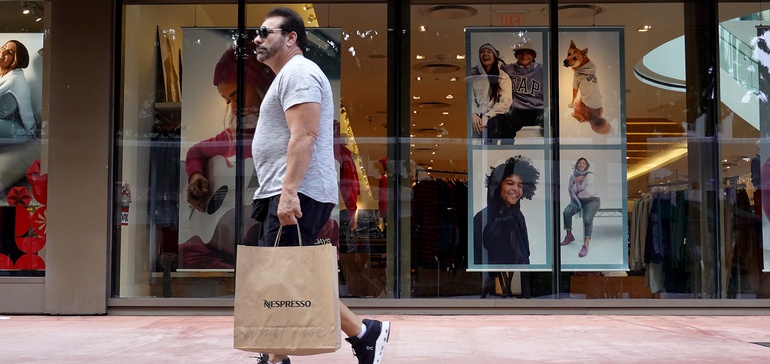Joe Raedle via Getty Images
By Tatiana Walk-Morris
Source: www.paymentsdive.com, February 2022
Dive Brief:
- Following the winter holidays shopping bump, reports from card companies Mastercard and Visa indicated consumer spending has strengthened despite the ongoing COVID-19 pandemic and rising inflation.
- The Mastercard SpendingPulse report showed that January U.S. retail sales increased 7.2% over last year, and online sales rose by 10.4% from January 2021. Among the categories that saw growth were apparel, electronics and appliances, per the report.
- Visa’s Spending Momentum Index was 102.4, slightly lower than 109.4 in December, indicating spending remains strong after the holiday sales rush. Visa attributed the dip to the omicron variant of COVID-19, but noted the surge did not completely disrupt the economic recovery.
Dive Insight:
The Visa and Mastercard reports reflect a cautious optimism about consumer spending at the start of the year. Mastercard’s report attributed the increase in consumer spending to income growth, increased consumer savings and the slow return of experiential purchases, such as restaurants.
The SpendingPulse report noted that e-commerce sales increased 110.1% compared to pre-pandemic levels, signaling a broader shift towards online shopping. Compared to 2019, total January retail sales were up 22.1%, Mastercard found.
Mastercard’s report included travel services, such as airlines and lodging, in its U.S. retail sales figure. The emergence of the omicron variant disrupted the travel industry’s recovery, which spelled trouble for card issuers hoping for a boost in travel spending.
“Coming on the heels of the holidays, January typically marks a month of returns and exchanges. However, the strong growth across sectors reflects the optimism and eagerness for the year ahead,” Mastercard senior adviser Steve Sadove said in a statement. “With nearly all sectors up, we see consumers returning to their shopping habits with a continued emphasis on digital.”
Meanwhile, Visa’s research reflected a slight downturn across multiple categories from the holiday spending peak in December 2021. According to the Spending Momentum Index, discretionary purchases dipped 3.9 points from December, and non-discretionary purchases also dropped by 2.4 points. The report also pointed to severe winter weather as a factor in declining consumer momentum.
Consumer demand has been less affected by each COVID-19 wave, the Visa report noted, but business disruptions have increased, playing a part in rising inflation.
“The SMI readings continue to reflect that there is a clear indication of spending growth moderation in January,” Visa’s chief economist Wayne Best said in a statement. “That said, we expect more robust spending in the months ahead as virus concerns slowly subside.”

